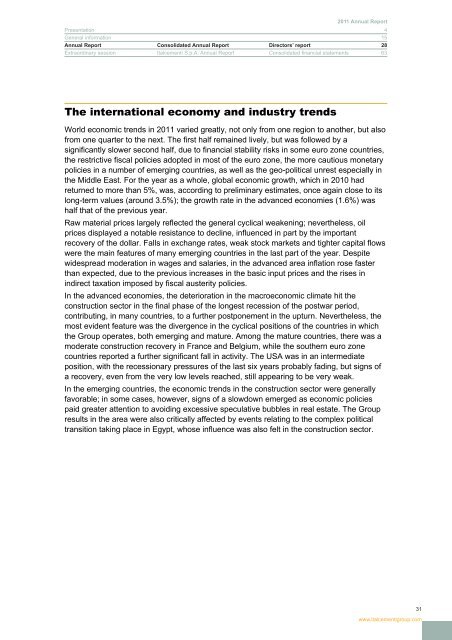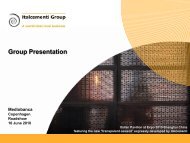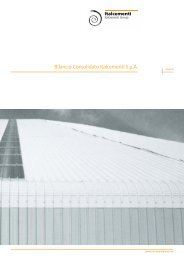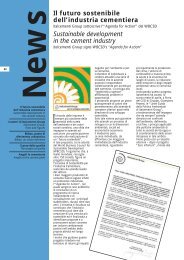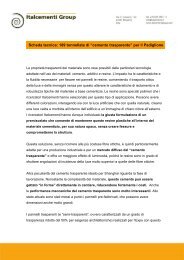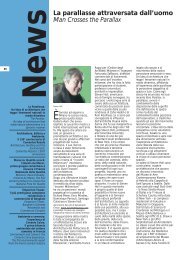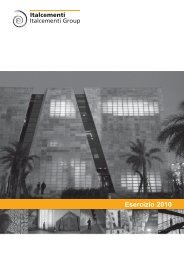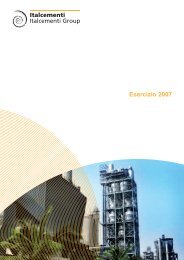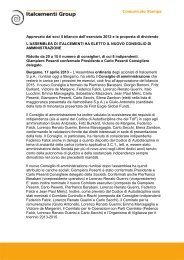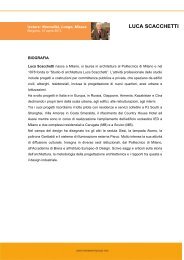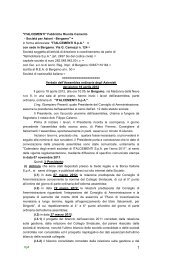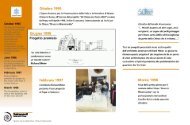- Page 1: 2011 Annual Report
- Page 5 and 6: 2011 Annual Report Italcementi S.p.
- Page 7 and 8: The Group has decided to take a fur
- Page 9 and 10: 2011 Annual Report Presentation Ita
- Page 11 and 12: 2011 Annual Report Presentation Ita
- Page 13 and 14: 2011 Annual Report Presentation Ita
- Page 15 and 16: 2011 Annual Report Presentation Ita
- Page 17 and 18: 2011 Annual Report Presentation 4 G
- Page 19 and 20: 2011 Annual Report Presentation 4 G
- Page 21 and 22: 2011 Annual Report Presentation 4 G
- Page 23 and 24: 2011 Annual Report Presentation 4 G
- Page 25 and 26: 2011 Annual Report Presentation 4 G
- Page 27: 2011 Annual Report Presentation 4 G
- Page 30 and 31: Directors’ report Following the a
- Page 34 and 35: Financial performance in 2011 Key c
- Page 36 and 37: In cement and clinker, performance
- Page 38 and 39: Revenue and operating performance C
- Page 40 and 41: The loss relating to continuing ope
- Page 42 and 43: Net debt breakdown (in millions of
- Page 44 and 45: 4. Implementation of defined mitiga
- Page 46 and 47: Financial disclosure risks The main
- Page 48 and 49: the negative trend in sales volumes
- Page 50 and 51: Ready mixed concrete sales volumes
- Page 52 and 53: ASIA Thailand India Others (1) Tot
- Page 54 and 55: 70% by Fotowatio Italy, a subsidiar
- Page 56 and 57: During the year Italcementi S.p.A.
- Page 58 and 59: Raw materials and alternative fuels
- Page 60 and 61: Engineering, technical assistance,
- Page 62 and 63: After a revenue decline in 2009 and
- Page 64 and 65: Outlook The markets on which the Gr
- Page 66 and 67: Financial statements Statement of f
- Page 68 and 69: Statement of comprehensive income N
- Page 70 and 71: Statement of cash flows Notes 2011
- Page 72 and 73: 21. Deferred tax assets and Deferre
- Page 74 and 75: limits in question. The benefits ar
- Page 76 and 77: Associates Associates are companies
- Page 78 and 79: 1.5 Translation of foreign currency
- Page 80 and 81: Subsequent to initial recognition,
- Page 82 and 83:
Deferred tax assets and deferred ta
- Page 84 and 85:
1.21. Trade payables and other paya
- Page 86 and 87:
2. Exchange rates used to translate
- Page 88 and 89:
4. Operating segment disclosure The
- Page 90 and 91:
The table below sets out segment re
- Page 92 and 93:
The table below sets out other segm
- Page 94 and 95:
5.2 Investment property (in thousan
- Page 96 and 97:
As in 2010, for the CGUs in the EU
- Page 98 and 99:
Sensitivity analysis With reference
- Page 100 and 101:
Other equity investments at Decembe
- Page 102 and 103:
14. Share capital and Share premium
- Page 104 and 105:
Net liabilities determined on the b
- Page 106 and 107:
The table below sets out key data f
- Page 108 and 109:
of the favorable ruling obtained in
- Page 110 and 111:
22.1 Financial liabilities Financia
- Page 112 and 113:
No drawings had been made on the sy
- Page 114 and 115:
As a result of the Moody’s rating
- Page 116 and 117:
At December 31, 2011, lines of cred
- Page 118 and 119:
22.3.1 Fair value of derivatives Th
- Page 120 and 121:
22.4.1 Interest-rate risk hedging T
- Page 122 and 123:
With regard to financing for subsid
- Page 124 and 125:
In 2011, in view of the surplus acc
- Page 126 and 127:
26. Services Services amounted to 1
- Page 128 and 129:
28. Other operating income (expense
- Page 130 and 131:
The reconciliation between the tax
- Page 132 and 133:
35. Earnings per share Earnings per
- Page 134 and 135:
36. Transactions with related parti
- Page 136 and 137:
38. Statement of cash flows 38.1 Ca
- Page 138 and 139:
40. Audit fees (as per CONSOB Resol
- Page 140 and 141:
Annex 1 The following table has bee
- Page 142 and 143:
Company Registered office Share cap
- Page 144 and 145:
Company Registered office Share cap
- Page 146 and 147:
Company Registered office Share cap
- Page 150 and 151:
148
- Page 152 and 153:
Directors’ report Any changes in
- Page 154 and 155:
which remained the most dynamic com
- Page 156 and 157:
Statement of financial position, ca
- Page 158 and 159:
Dealings with subsidiaries, joint v
- Page 160 and 161:
Risks and uncertainties Italcementi
- Page 162 and 163:
Ratings risks The Group’s ability
- Page 164 and 165:
January 2011 entitled “Europe at
- Page 166 and 167:
Ciments Français S.A. profit for t
- Page 168 and 169:
INFORMATION ON OWNERSHIP STRUCTURE
- Page 170 and 171:
l) Laws applicable to the appointme
- Page 172 and 173:
- Selection of priority risks and d
- Page 174 and 175:
) implementing the guidelines defin
- Page 176 and 177:
A) ORGANIZATIONAL STRUCTURE Board o
- Page 178 and 179:
No limits to re-eligibility of dire
- Page 180 and 181:
* Mittel S.p.A. - Director Pierfran
- Page 182 and 183:
The Code provides for the Board of
- Page 184 and 185:
Lastly, the Board of Directors, in
- Page 186 and 187:
) a brief resume on the personal an
- Page 188 and 189:
) evaluate the proposals made by ex
- Page 190 and 191:
time to express their point of view
- Page 192 and 193:
In addition, the Chief Executive Of
- Page 194 and 195:
During 2011 the Internal control co
- Page 196 and 197:
TABLE 1 STRUCTURE OF THE BOARD OF D
- Page 198 and 199:
to be noted that CONSOB, the Italia
- Page 200 and 201:
* indicates the responsibilities, p
- Page 202 and 203:
consolidated financial statements.
- Page 204 and 205:
to apportion the profit for the yea
- Page 206 and 207:
Department of Human Resources and O
- Page 208 and 209:
A) VARIABLE COMPONENTS Under the Po
- Page 210 and 211:
This plan aims at: - tying the over
- Page 212 and 213:
The variable components are aligned
- Page 214 and 215:
With reference to the other offices
- Page 216 and 217:
The Board of Directors may also gra
- Page 218 and 219:
) Plan Management The corporate bod
- Page 220 and 221:
g) Any Support for the Plan by the
- Page 222 and 223:
position of the role of each benefi
- Page 224 and 225:
2) With respect to the stock option
- Page 226 and 227:
Name, surname Position Period durin
- Page 228 and 229:
Yves René Nanot Marco Piccinini At
- Page 230 and 231:
Monetary Incentive Plans in Favor o
- Page 232 and 233:
Participation of Governing and Supe
- Page 234 and 235:
3) Term of the authorization. The a
- Page 236 and 237:
specifically, with laws and regulat
- Page 238 and 239:
Each section shall list in progress
- Page 240 and 241:
238
- Page 242 and 243:
Financial statements Statement of f
- Page 244 and 245:
Statement of comprehensive income (
- Page 246 and 247:
Statement of cash flows (euro) Note
- Page 248 and 249:
Notes The Italcementi S.p.A. financ
- Page 250 and 251:
1.2. Accounting policies and basis
- Page 252 and 253:
1.7. Property, plant and equipment
- Page 254 and 255:
1.13. Inventories Inventories are m
- Page 256 and 257:
Past service cost Changes in liabil
- Page 258 and 259:
Interest income Interest income is
- Page 260 and 261:
2.1 Investment property Investment
- Page 262 and 263:
The list of investments in subsidia
- Page 264 and 265:
Current assets 6. Inventories (in t
- Page 266 and 267:
Equity 12. Share capital At Decembe
- Page 268 and 269:
Dividends paid Dividends approved i
- Page 270 and 271:
18. Deferred tax assets and deferre
- Page 272 and 273:
19. Net debt An itemized correlatio
- Page 274 and 275:
Main bank loans and drawn and avail
- Page 276 and 277:
At December 31, 2011, the average m
- Page 278 and 279:
19.3.1 Fair value of derivatives Th
- Page 280 and 281:
19.4.1 Interest-rate risk hedging T
- Page 282 and 283:
ELECTRICITY In 2011, Italcementi S.
- Page 284 and 285:
Income statement 23. Revenue Revenu
- Page 286 and 287:
Stock options The company has set u
- Page 288 and 289:
30. Finance income (costs), exchang
- Page 290 and 291:
Breakdown of receivables and payabl
- Page 292 and 293:
Commitments with related parties (i
- Page 294 and 295:
(Breakdown of revenue and costs wit
- Page 296 and 297:
(Breakdown of revenue and costs wit
- Page 298 and 299:
Impact of transactions with related
- Page 300 and 301:
34. Audit fees Pursuant to the CONS
- Page 302 and 303:
Annex 1 Highlights from the most re
- Page 304 and 305:
Report of the Board of Statutory Au
- Page 306 and 307:
On the other hand, the absence of a
- Page 310 and 311:
308
- Page 312 and 313:
Report of the Board of Directors Pr
- Page 314 and 315:
Current text ordinary and/or saving
- Page 316 and 317:
Current text In each list, the name
- Page 318 and 319:
Current text If there are no lists,
- Page 320 and 321:
Current text means of another perso
- Page 322 and 323:
Current text If a subject connected
- Page 324 and 325:
The proposed amendments do not gran
- Page 326 and 327:
• operate, in compliance with cur
- Page 328:
Corporate bodies resulting from the


